The Seismic Shift In Leadership With Michelle Johnston
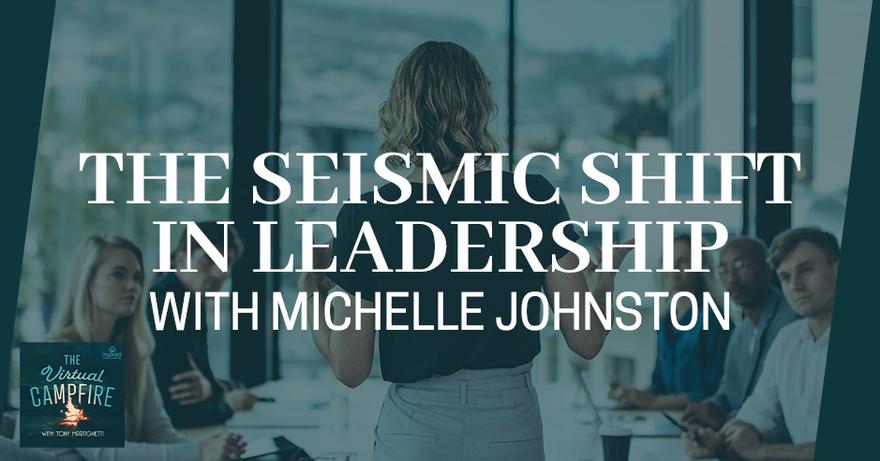
Leaders are not getting pushed out of their organizations because there is a seismic shift happening. These leaders were subscribing to command and control instead of human connection. Leaders who can't connect with their team won’t find success. You need to connect with your people and show up as a human. You don't have to be perfect, just be your authentic self. Join Tony Martignetti as he talks to Executive Coach, Michelle Johnston about her new book Seismic Shift. Learn what seismic shifts are happening in the world right now ever since the pandemic. Discover the importance of connection and why you need to learn how to connect with yourself first. And find out Michelle's thoughts about writing a book and the process that came with that. Stop trying to be perfect and start becoming human today!
---
Listen to the podcast here
The Seismic Shift In Leadership With Michelle Johnston
It is my honor to introduce you to my guest, Michelle Johnston. Michelle is a Management Professor, Executive Coach and Leadership Expert, helping leaders achieve results through meaningful connections. She's an award-winning professor studying leadership and business communication and her research has shown a clear link between a team's effective communication and its positive financial performance and getting results.
Michelle is a celebrated keynote speaker presenting at conferences in events nationwide. She received her PhD in communication from Louisiana State University. She was named to the prestigious 100 Coaches Group, which consists of the top executive coaches around the world. Michelle serves as the Gaston Chair of Business at Loyola University, New Orleans, where she teaches in the graduate and undergraduate programs in the College of Business.
She lives in her beloved city of New Orleans and she's now an empty nester. She sent her daughter off to college. The Seismic Shift, which is her first leadership book is an Amazon bestseller and is at number two in the leadership category. Michelle, it is truly an honor to welcome you to the Virtual Campfire.
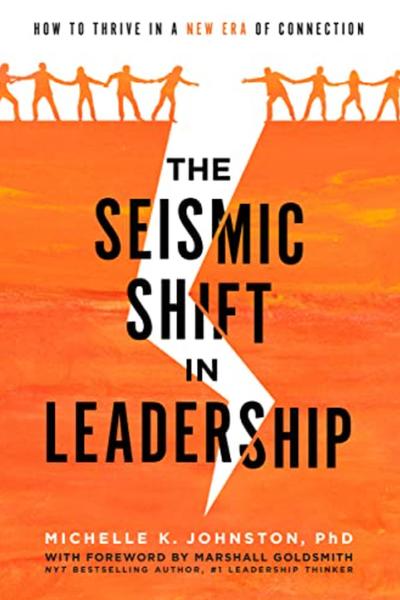
Tony, I've been looking forward to being on the Virtual Campfire. Thanks so much for having me.
Me too. I'm so thrilled to have you here. As I was introducing you, there are so many great things about your intro but some of the language I don't know if I pronounce everything as it should be, but we're not perfect here.
That's so much a part of the story in the book here that I can't wait to talk to you about. No one is perfect and we shouldn't strive to be.
There you go. One of the things I love to do on the show is we would bring people on who are making a huge impact in the world and obviously, you are. I want to uncover the story and the journey that got you to do what you're doing. What we do is use this concept of flashpoints. These points in your journey have ignited your gifts into the world. What I want you to do is share those moments that have brought you to life to where you are. As you're sharing what you're called to share, let's pause along the way and see what's showing up. With that, Michelle, I want you to go ahead and share what you're called.
I feel this is such an exciting point where I am now in my life to get this message out that there is a seismic shift going on, a profound seismic shift. One of the clients that I coached was the Chief Financial Officer of the largest employer in Louisiana, which is Ochsner Health. He was named the new CEO. As his executive coach, we've been having lots of messaging calls. We are so on the same page that if you are a high-level leader now, it's time to disrupt.
There are seismic shifts that are happening in every part of our lives, all of us. I find it a fascinating conversation. I'd love for your audience to think about what you want to be better in your life. Do you want a friendlier work environment, more welcoming, more inclusive, and kinder? I don't feel like we have resilience anymore for jerk bosses. I want all of us to say, “It's not okay anymore.” We can show up as kinder, more compassionate, and more caring humans. You can be a boss that gets results through connection and through a kinder workplace.
I feel like I'm sitting on something that I'm so passionate about to get this message out. Your point, Tony, is where in the world did this all begin? I've been doing a lot of reflecting and I wasn't always great at connecting. My big message is the seismic shift in order for you to be successful now as a human being. The book is called The Seismic Shift in Leadership, but to be honest with you, it could be just The Seismic Shift.
To be successful as a human being now, and successful means to be happy, to be satisfied, and to be fulfilled. It is all about connection but I wasn't always the best connector. I grew up as a corporate brat. With that, life is full of trade-offs. I had an amazing father who was very committed to his career at General Motors. We moved every two years. My dad, who was still alive and still on a pension with General Motors and still buys General Motors cars was the quintessential loyal corporate citizen back then. In his head and he tells me to this day, “I could never say no because I was getting promoted. In order to stay with the company, you had to say yes.”
Being successful, happy, satisfied, and fulfilled is all about connection.
My dad was good at what he did. Back then, if you got promoted, they didn't want you to manage those who you were peers with, so they moved you to a new market. We moved from DC to Baltimore to Memphis, Tennessee to New Jersey and Detroit to Nashville to Tampa to Birmingham. They kept moving and he made it very exciting. I loved meeting new friends. I loved learning about new cultures and getting to know people. I loved it. However, it ended up biting me in the butt because I got good at fitting in.
Once I started my career as a very young professor in the business school at Loyola, all I knew was how to fit in. I went in and looked around, and the leadership style in Vogue was very command control and authoritarian leadership style. That was not my personality at all but I wanted to succeed. I emulated these other leaders who were succeeding and students loved them. They were so good at what they did.
I tried it and I lost complete connection with myself and with my students because I was trying to be somebody else. That's when I realized that perfection equals disconnection. I was trying to be perfect. In my eyes, I was wearing this mask of perfection or whatever. Perfect is different things for everybody. All of a sudden, I was able to pivot. Thank goodness, I had a fantastic boss. A dean who brought me into his office and said, “Michelle, I don't know what you're doing but I will invest in you. I believe in you. We've got to figure out how you can do a better job connecting with your students because you're not getting good faculty evaluations and we're at Loyola. You have to be a great teacher.”
I went to all kinds of teaching workshops. They invested in me and I'm so appreciative of that. I finally figured out that I wasn't connecting because I wasn't myself. When I finally gave myself permission to give up perfection, which is the opening line that I shared. Nobody is perfect. Let's get rid of that fallacy. It's progress every day and it's even more than progress. It's about giving yourself permission to be authentic and be you, and bring your gifts into the world.
I had to work hard. This is interesting too to talk about a flashpoint. I think it's easy. We can tell the audience, “Give up perfection. Nobody's perfect, just be you.” In my case, because I was so adept at fitting in and moving around every two years, I didn't know who I was. I'm like, “I need to be me. Who is that? Who is this person Michelle Johnston?” I had to spend a lot of self-reflection and a lot of time understanding who I was, what my story was, and what gifts I brought to the table, but also some of my blind spots, some of my challenges, and to work on becoming a fully well-rounded person so that I could lead with those gifts, and make those connections with others.
There are so many things that I loved about what you shared, but there's something that starts from the molding that you got from a young age. Your father's career was a yes-man mentality that says, "You do what you have to do because that's what is expected." When you get wired in that way and you see that mentality, which we all got brought up in that mentality, we then have to unprogram ourselves and unlearn those practices.
That's where a lot of this perfectionist starts to show up where you start to say, "Being perfect is all about wanting to make a good impression on other people. Wanting to do well by other people." We have to unlearn all that and figure out what we truly want. This is where the connection comes in. It is to understand what I want. Not even connecting with others, but start connecting with yourself.
That's right and that's what I learned. The reason why I wrote the book was never about me and my journey. All of a sudden, I was this executive coach. I was seeing these leaders get pushed out of organizations because they were subscribing to command and control. They were doing what had been successful. Now, they're getting pushed out. Whenever I began coaching, I conduct a 360, so I have all this data. The data was telling me that these leaders were getting pushed out because their teams didn't trust them.
They created environments of what I call cultures of fear. When you're a leader and you've created an environment that's fearful, then you're not innovative. You're probably not making as much money as successful as you can be because you're leading by intimidation. When I dug deeper into the data, what I realized is that those leaders are getting pushed out because they weren't connected with their teams because they weren't connected with themselves.
Leaders cannot connect with their teams if they cannot connect with themselves.
That's a powerful place to start. Nowadays in the workplace, there's a sense of people wanting to be more of themselves in the workplace. I hope that's the mentality that we're trying to create now. We need to make sure the leaders understand, “How do I let people be themselves more?” Create that environment of the whole human showing up, so we can all connect.
That is what I'm pushing. Pre-pandemic, it would be my professional self and then my personal self. I believe that because we all had to go on lockdown and we're all on Zoom, all of a sudden, we're in each other's kitchens. We're competing in our personal lives and with everybody in the family. All of a sudden, our team is seeing us with challenges as full humans, having to eat lunch because I haven't had five minutes through the day. The UPS man, the doorbell ring, the dogs bark, and the babies are crying. All of a sudden, you had to be fully human.
I truly don't believe that we're ever going to go back or that we should go back to this demarcation of, “Bring your full professional self to work,” then your personal self is for something different. I think it's all in one. It’s showing up as a human and as a leader, and seeing people as humans. The gentleman whom I referred to, Pete November, who's the new CEO of Ochsner Health. He has me sit into his team meetings that are still on Zoom. He works at the hospital and he insists on every meeting.
He's now the CEO and it's almost 40,000 employees. This is a pretty big company, and he spends the first 15 minutes of every big meeting saying, “I want to know how you are. Honestly, tell me on a scale of 1 to 10, we're going to go around and I want you to tell me how are you personally, what's going on, and how are you prep professionally because you matter to me.” Some of my leaders, what I would tell them is, “Please begin with a connection question, especially when you're doing it on Zoom.” They'd say, “I do that in one on ones.” I'd say, “That's great. That's awesome.”
The reason why it's important to do it with your team is because in this hybrid work environment where there aren't as many ways to meaningfully connect, what you're doing for your team is you are embedding this time to get to know each other on a personal level. I believe that we have to do that or it's not going to happen.
I love what you shared because there's something about this. Even when one person is sharing their challenges, it almost speaks for the rest of the people who are in the room too to say, “That's what I'm going through too.” It's so great to be connected and to know that there are other people who are having that same challenge as I am. You put words to my emotions and to the feelings that I'm having at this very moment. It feels validating and comforting to have that.
You are so right. It was on one of these on a scale of 1 to 10 in this big meeting that the head of information services said, “I sent my youngest kid to college. I'm an empty nester. Personally, I'm struggling.” Somebody else on the team said, “I had no idea. Me too.” All of a sudden, you have that commonality forever together. That's how you build trust.
You've got to embed time. Many leaders want to hop on a call and say, “I sent out the agenda. We are not doing well financially. I want some updates. How are you moving the needle on your goals?” You can do that all day long and in my humble opinion and the research supports me, you're not going to get a high-performing team if you lead like that. You have to spend time building that trust and psychological safety and connection with each other, and then you can soar.
I want to take you back into your story a bit and I want to find out more about what were some of the trials and tribulations that you've overcome as you've come into the work that you're doing. I'm certain that you've had some ups and downs that you've had to overcome, especially navigating the path of this message. Not everyone is ready to hear it.
That is the truth. I think this whole thing of giving up perfection, I didn't realize that I was a perfectionist. I honestly didn't. That has been a tough one. I went on a podcast and my friends could not believe it. I'm going to share what I shared on the podcast. The last question the host asked me was called something about grace, “What have you done to give yourself grace?”
It was when we were still in the middle of the lockdown. I said, “There are times when I make brownies, just to lick the brownie bowl.” I was like, “Yes, I do and I lick the bowl.” My friends, we have coffee together in person once a week. We started this during the pandemic. It’s honestly, one of the blessings of my life. We would have masks on. We'd be 6 feet apart. We'd meet outside but it's been every single Monday morning with my best girlfriends.
When I told them that, still to this day, I said, “I admit it. I made brownies just to lick the bowl.” They said, “Oh my gosh.” I said, “You have to give yourself permission to be human.” At this point, as humans, we’ve all gone through the toughest time, a very lonely time, and a very disconnected time. I think it is all about giving up perfection and saying, “I am human and today, maybe it wasn't my best day but I got through it.” If it took me baking brownies just to lick the bowl, I'm okay. I think that's so important to give up this notion that we're perfect. None of us is.

Especially in light of the fact that you've got the minds of young adults. I'll call them young adults because I know that you have a range of different students coming through Loyola, but you've got a lot of people coming to you. They're relying on the insights and things that you're sharing with them. I can imagine the pressure. You have to lead by example. By them getting to see that perfection is not the goal, that's important.
It’s just to be human. One of the clients that I coach, we were going back to work before one of the other variants, before Delta or something. I said, “What are you going to do to bring your team together to connect? You haven't seen them in two years?” He said, “I have a new house and on a lake. I was thinking about having them over for a cookout but I got to be honest, my last boss told me that was not okay. You had to keep professional as professional, personal as personal. Don't mix the two.” I said, “In this new era, that couldn't be further from the truth. Please invite your people over for a cookout. I think that's a fabulous idea.” That was one of the best things he did.
In this environment where so many employees are opting to still work from home, it is on the leader to figure out ways to create extraordinary connections. I call it extraordinary connection because meaningful connection, I consider it ordinary. What are you doing to be extraordinary? Are you having off-sites? Every quarter, can you afford to say, "We're going to go and meet at a conference room in a hotel halfway midpoint where all of us work so that we can be together and break bread together."
I even had one of my leaders said, “Let's do a team offsite.” I said, “What do you want the curriculum to be?” He said, “I want the curriculum to be let's just get together. Let's go to the World War II Museum and take a tour. That's it.” He said, “We have not been together in two years. We just need to do something together. No curriculum. No agenda.”
That's what I'm seeing. It is that we are humans and humans need social connection. If you've been apart from your team for a while and it's possible in some way, do something together. I've got leaders arranging pickle ball and top flight and meeting in the park for a picnic. Try to do something to bring people together.
It's powerful what you're sharing because there's a sense of what's appropriate and what I can do. It starts with asking. If you don't know, ask and see what people want. See what lights them up and start anywhere. Start from any place and see what resonates, but doing nothing is not going to help.
We speak the same language. I love what you said. If you don't know, just ask. That's the first order of business for any leader in a new role. “What do you think I should do first?” I say, “Go on a listening tour. Go and don't make any changes for six months if you can. You will get all the data you need to make the best decisions but first, ask.”
The first order of any new leader is, "If you don't know, just ask."
It's beautiful. Before we get too far along, I want to ask what are the things you've learned about yourself in this journey into getting to where you are now, especially with writing the book? What were the things that were the biggest standout lessons that you've learned about yourself that you haven't shared already?
I felt called to get this message out because I wanted to help people. I started thinking that my sphere of influence was pretty small. Loyola is small, so my class sizes. I taught my leadership class and we had a guest speaker who talked in a very similar language that you had used. She's like, "I had to spend years unlearning the things that I thought would take to be a successful leader." It was a special class, but I have these small class sizes and I coach about twenty leaders. I thought, “To get this message out, I wanted to go big,” because I felt that it was global and it was needed. My mentor Marshall Goldsmith has had to work with me and sit me down because I have been so uncomfortable with promotion.
As a matter of fact, I went on Facebook to my only 120 friends saying, “I'm so uncomfortable with this but my publisher is running a $1.99 special on Amazon. Will you help me spread the word? My book is number two. Maybe we can get it to number one. If it gets it to number one, then we have more opportunities to make an even bigger impact.”
I'm trying to frame it, but feeling uncomfortable has been one of the toughest things for me. What I've learned is then you have to sit in your discomfort and you have to do it. Marshall said, “Is it more important to get your message out and to help people or is it more important for you to continue feeling comfortable?” I said, “You're right. That's why I wrote this book. It is because I wanted to get the message out.”
You can't just write a book and hope and pray that people buy it. So much of writing a book is the promotion, of getting out on podcasts, of giving speeches, of getting on social media and selling why. It's more educating why people could benefit from this book. Learning how to be uncomfortable and then pushing through that, believing that it's worth it to get the message out. That has been my biggest.
My second one is so many people think that if you become an author, you love to write. I did not. I have a graduate assistant. I said, “Meet with me once a week and push record and I'm going to talk. I'm going to tell you stories. I'm going to talk extemporaneously about what I've learned about leadership. We can group it together, then I'll go interview people.” I did not sit in front of the proverbial typewriter or in front of my laptop and type. I didn't. I spoke about it and that's how the book came to be.
I love what you shared because there are two things I'll say, where there's a will, there’s a way. People think, “I can't write, I can't do this.” There's always a way if you're willing to get uncomfortable. Anyone who has been in your shoes can see that it is uncomfortable to be out there trying to promote something, but you know that holding back is selfish. It's holding all that stuff and the learnings and the things that need to be given to people in terms of lessons and the learnings. That becomes almost selfish to hold it back. You have to get out there and you have to get uncomfortable. We have to take our own medicine, which oftentimes we're telling other people, “How could you not do this? This is what you're meant to do,” and then not do it ourselves.
You are so right. I love how you framed it as selfish. If I held onto this, that is a selfish act because I know in my heart and I've seen that if I can get this information out there to others, I can save their jobs. Not just save their jobs. I can help them be more satisfied, more successful, and more effective.
By letting go, we're being of service to more people. I'll be your champion for that. I'm with you.
Thank you, Tony.
I love what you shared. Those lessons are the things that get people to step into their greatness. Tell me more about Seismic Shift. What is it that you haven't shared so far about this book that you think is important for people to understand about this?
There are seismic shifts going on now in everything. What I refer to as the Seismic Shift in leadership is moving from that command and control culture of fear, and that authoritarian style. What I'm advocating is for leaders to create cultures of connection. I believe that connection is at three levels. You have to look at what we talked about earlier, and connect with yourself so that then you can show up authentically, find your voice, own your story, know who you are, what your brand, what are your values, and then you show up. That connection with your team is becoming much more about showing that you care about your team on a personal level as a full human.

I interviewed eighteen leaders for my book and one of them, Juan Martin, is the global president of KIND bars. It's such a cool concept for a company because, in one of our interviews, his next meeting after me was with the CEO. It's a privately held company called Mars, that bought Bars and M&M’s and pet food and many other products. He was getting his annual evaluation by the president of the board. I said, “How many KIND bars did you sell?” He said, “Michelle, I'm not evaluated on how many KIND bars I sell every year.”
I said, "What else are you evaluated on?" He said, "How many acts of kindness?" I said, "What was the goal?" He said, "250 million." It's companies like that inspire me. He's at the helm of this company that is doing things differently. They truly believe in making the world a kinder place. He's evaluated every single year and they're using the profits of this KIND bar to help make the world a kinder place.
That's a great example of connection with your team and that top-level is the connection with the company. What are the company's values? What is the strategic direction, and how are you going to get your people aligned so that you can all move in the same direction? Those are different skill sets, connection with self, connection with your team, and connection with your company. I believe it takes all three for you to be successful now.
I love what you shared. Also, something about this is to say there's a ROC or return on connection. You alluded even in your bio when I introduced you to this financial performance that we're gearing towards here. You don't have to sacrifice financial performance in order to also do amazing things and make an impact on people.
The great thing about connection is that it has an impact on the people around you, and they in turn do great work because they feel connected. That ROC is what we're after here. Put out this strong connection with the people around you, starting with yourself. What happens is you start to create this ripple that now is bringing return back into your company, which is a powerful thing.
Again, just because my client became CEO and I watched his big presentation right before this. One of the things he said when he was introducing himself because not everybody knows him. He was the chief financial officer. He'd show up with financials but they didn't know who he was about. Tony, it was so beautiful because he did what you said. He stood up and said, "I'm humbled and I'm grateful to be in this position. Let me share with you who I am."
He said, “I grew up with a single mom as a nurse and she always put her patients first. I remembered many hours waiting at the hospital for her and I valued so much her commitment to the hospital and its patients and its purpose. There was something bigger than her. I knew at that time, one day, I would work in healthcare.” By him sharing that story, he truly knew where he came from. He was connected with himself. By sharing that story, 36,000 employees say, “Now I see you. I know your story. I know who you are. I know why you do what you do.” He was able to connect with the purpose of the company. That's a beautiful example of connection at every level.
We can't top that. We're going to mic drop on that. Well done. I love what you shared. It is such a powerful insight to see that. It's a three-dimensional model of connection and it's powerful. I'm inclined to ask one question before we get into the last question, which is to say, what's next for you? Where are you headed next? What is on your horizon?
Rather than thinking about my next book, since I published this February 22nd, this spring. I want to enjoy at least, for the first year. I met with an agent and I would like to go on the speaking circuit and deliver some keynotes around the world. I think that gives me another opportunity to get the message. I've been doing podcasts in Vietnam, Netherlands, England, Spain, France, and all over the place but I want to get in front of people.
Especially maybe get out to Dubai and in the Middle East and spread this message. We're pretty progressive here in the United States. We understand to show up in a more compassionate way and I want to get the message out. I'm not even going to think about my second book. Now, I want to get on a world tour and get the message out.
The reason why I ask is because I wanted to know if you get a connection in person. I think where we are now, we're starting on the right trajectory. It seems like this is a good time to get out there and spread that message and go global. Don't be selfish.
Thank you.
I have one last question for you. That is what are one or two books that have had an impact on you and why? I am sure your book has had a huge impact on you but I'd like to know what else?
I remember on my 40th birthday, my girlfriend gave me Brené Brown’s book called The Gifts of Imperfection. It had a profound impact on me because that was the first time in my life that I realized I was a recovering perfectionist. That was the first time in my life that I realized that perfection equals disconnection. That was the first time in my life that I realized I had spent my life trying to fit in and yet, I didn't feel like I belonged.
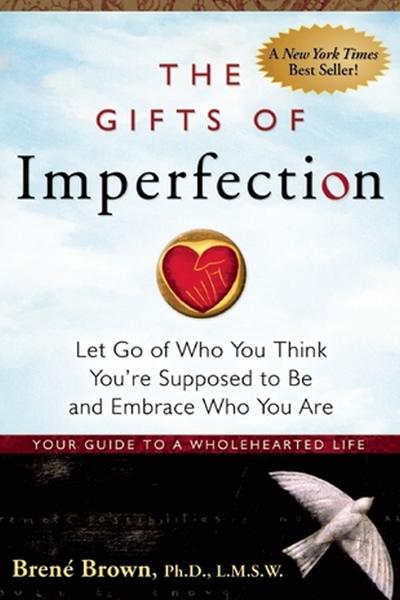
That was huge, and then I became a huge fan of Brené Browns and learned from her that she had to self-publish her first book because she couldn't find a publisher. There were lots of struggles in the beginning but she believed so much in her message of belonging and wholehearted leadership and becoming a wholehearted human that she persevered and pushed through. She's a real role model of mine.
She has blazed a trail for so many of us to get comfortable with sharing our message and being imperfect with that too, which I think is great. We don't have to be some polished person on stage. Be real and share what's in your heart. That's powerful. Thank you for sharing that. Is there another book that you want to share or is that the only one?
I remember and I wrote about this in my book, Tony. I remember being on my dad's study floor in the '70s, with gold shag carpeting. I remember vividly with my mutt of a dog and seeing a book on his shelf, Dale Carnegie's How to Win Friends & Influence People and taking it off the shelf, and reading the opening passage about Dale Carnegie's dog named Skippy or Tippy or something.
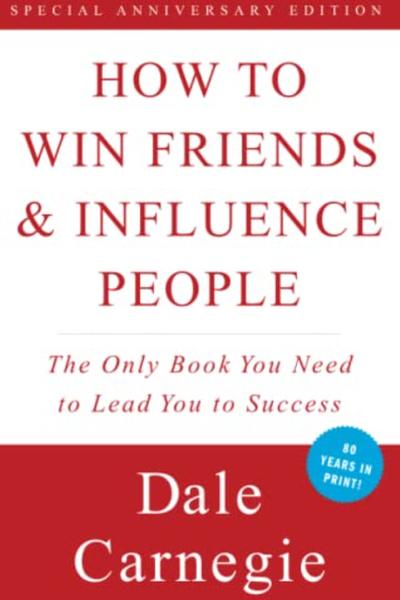
It was this passage that Dale Carnegie learned from his dog. His dog made people feel good because the dog was so much more interested in other people than getting them interested in the dog. He used that lesson and it resonated with me because I was already at age, I don't know how old I was at the time but I'd already moved so much that I realized that the places that I moved to, if I talked about myself, "Let me tell you about where I came from. The coolest people live there. It's so beautiful. The weather is perfect.”
They don't care about that so much, but if I moved to a new place and said, “I want to know about you. Tell me about you. Tell me about your customs, your traditions, and your rituals. Show me your favorite places to eat," and I show interest in them. That's how you build connections. Showing interest in others. That's a big influential book, for sure.
Showing interest in others is how you build connections.
The way you shared it was so beautiful because I've read the book and I've heard people mention it on the show, but you took such a great angle on this. I think it's Tippy.
Yes, and the lessons learned from Tippy and it's so true. The leaders that I've seen that make it all about themselves and try to get everybody impressed and interested in them don't have a connection, but when you're the leader who makes it all about his or her people.
That's the difference maker. I can't thank you enough, Michelle. This has been such an enjoyable conversation, full of great insights and great stories. It has been truly a blessing to have you here.
You are well worth the wait, Tony and the Virtual Campfire. I can't thank you enough. I loved being on your show. You have a real gift and a beautiful gift as a host. Thank you for sharing.
Thank you. You made my day. Before I let you go, I need to make sure that the people who are reading now can find you. What's the best place to find you?
My website. It's MichelleKJohnston.com. Thank you again for having me.
You are so welcome and thanks to the audience for coming on the show. I know you're leading with so many great insights and you're full of energy to go out there and make some connections with people. Go out and make some things happen. Thank you again, Michelle.
Thank you, Tony.
Important Links
- Michelle Johnston
- The Seismic Shift
- Marshall Goldsmith
- Mars
- KIND
- The Gifts of Imperfection
- How to Win Friends & Influence People
- Pete November
- Ochsner Health
About Michelle Johnston
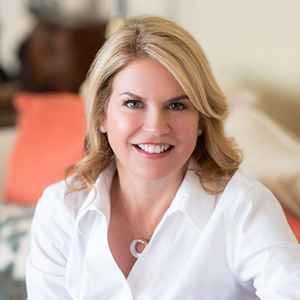 Dr. Michelle K. Johnston is a management professor, executive coach, and leadership expert who serves as the Gaston Chair of Business at Loyola University New Orleans.
Dr. Michelle K. Johnston is a management professor, executive coach, and leadership expert who serves as the Gaston Chair of Business at Loyola University New Orleans.
Michelle’s first book, The Seismic Shift in Leadership, is an Amazon bestseller and details the need for leaders to shift from a command and control leadership style to one that focuses on connection. Why? Because Connection drives long-lasting results.
She was recently named one of the most influential New Orleanians, a top 500 business leader, and a Woman of the Year by CityBusiness.
Michelle is a celebrated keynote speaker presenting at conferences and events nationwide. She received her Ph.D. in Communication from Louisiana State University and was named to the prestigious 100 Coaches group, which consists of the top executive coaches worldwide.
She lives in her beloved city of New Orleans, Louisiana, with her daughter, Elizabeth.
Love the show? Subscribe, rate, review, and
share! https://www.inspiredpurposecoach.com/virtualcampfire


0 comments
Leave a comment
Please log in or register to post a comment